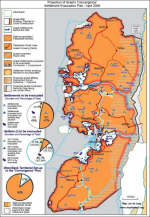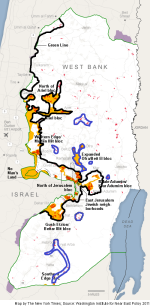raharris1973
Well-known member
What if the Bush Administration did not push for all-Palestinian elections in January 2006? This was part and parcel of the process leading a Hamas led Palestinian Authority government over Israeli-evacuated Gaza and various West Bank towns, where other parties like Fatah still operated, but that led to international sanctions of the PA government because Hamas did not change its ideological commitments on winning election.
This was following by violent Hamas-Fatah conflict, resulting in Hamas one-party/leading party rule over Gaza and the ouster of Fatah, and takeover by Fatah of Palestinian towns and villages in occupied West Bank surrounded by Israeli occupied territory and settlements and their ouster of Hamas.
 en.wikipedia.org
en.wikipedia.org
Pushing for a Palestinian vote was a particular quirk of the George W. Bush administration. I doubt Ariel Sharon was planning on dictating open elections would be held in Gaza or other Palestinian Authority administered places when he came up with and decided upon the Gaza disengagement plan a couple years earlier. While pro-Israeli policy is par for the course for American administrations, insistence on Arab partners having elections is not. And many Americans and westerners suspected if you asked for the voice of the Palestinian people, they wouldn't like what they heard.
In Israel, only one faction Natan Sharansky's affirmative supported Palestinian elections, everybody else seemed to go along as part of working with the Middle East Quartet, US-EU-(maybe Russia was in it).
If the Fatah -dominated PLO security forces are left in charge of evacuated Gaza without being forced to allow power sharing elections with Hamas, could they have kept Hamas out of power and kept international sanctions going along with cross-border/zonal produce trade, even as the Palestinian-Israeli peace talks proceed no further?
Or would Hamas likely find a way to successfully uprise and overthrow the Fatah dominated PA beyond the latter's ability to contain, leading to a Hamas controlled interior Gaza like OTL 2007-2023, or an Israeli invasion at whatever point Hamas would be overthrowing the PLO?
All in all, would things have matched the occasional outbreaks of larger Hamas-Israel fighting that broke out every couple years around Gaza from 2007-2022, with Gaza blockaded the whole time, or would there have been less large scale fighting (despite probable outbreaks of some kind), or actually more and earlier episodes of large-scale Gaza fighting resembling 2023, in the 2010s instead, with Hamas unable to discipline Gaza and make people bide their time?
----
Interesting Israeli 2016 report cited in the wiki article about Battle of Gaza of 2007 between Fatah/PLO and Hamas. It was a 10 year assessment of good idea/bad idea about the Israeli Gaza withdrawal. It's conclusion from the Exec Summary at the time was:
www.molad.org/images/upload/files/Disengagement-Eng-report-full_final-for-website.pdf
History from 2016 through 2023-2024 in particular might shine a different light or cast a different shadow on that conclusion, but it is what they said at that snapshot in time.
This was following by violent Hamas-Fatah conflict, resulting in Hamas one-party/leading party rule over Gaza and the ouster of Fatah, and takeover by Fatah of Palestinian towns and villages in occupied West Bank surrounded by Israeli occupied territory and settlements and their ouster of Hamas.
Battle of Gaza (2007) - Wikipedia
Pushing for a Palestinian vote was a particular quirk of the George W. Bush administration. I doubt Ariel Sharon was planning on dictating open elections would be held in Gaza or other Palestinian Authority administered places when he came up with and decided upon the Gaza disengagement plan a couple years earlier. While pro-Israeli policy is par for the course for American administrations, insistence on Arab partners having elections is not. And many Americans and westerners suspected if you asked for the voice of the Palestinian people, they wouldn't like what they heard.
In Israel, only one faction Natan Sharansky's affirmative supported Palestinian elections, everybody else seemed to go along as part of working with the Middle East Quartet, US-EU-(maybe Russia was in it).
If the Fatah -dominated PLO security forces are left in charge of evacuated Gaza without being forced to allow power sharing elections with Hamas, could they have kept Hamas out of power and kept international sanctions going along with cross-border/zonal produce trade, even as the Palestinian-Israeli peace talks proceed no further?
Or would Hamas likely find a way to successfully uprise and overthrow the Fatah dominated PA beyond the latter's ability to contain, leading to a Hamas controlled interior Gaza like OTL 2007-2023, or an Israeli invasion at whatever point Hamas would be overthrowing the PLO?
All in all, would things have matched the occasional outbreaks of larger Hamas-Israel fighting that broke out every couple years around Gaza from 2007-2022, with Gaza blockaded the whole time, or would there have been less large scale fighting (despite probable outbreaks of some kind), or actually more and earlier episodes of large-scale Gaza fighting resembling 2023, in the 2010s instead, with Hamas unable to discipline Gaza and make people bide their time?
----
Interesting Israeli 2016 report cited in the wiki article about Battle of Gaza of 2007 between Fatah/PLO and Hamas. It was a 10 year assessment of good idea/bad idea about the Israeli Gaza withdrawal. It's conclusion from the Exec Summary at the time was:
www.molad.org/images/upload/files/Disengagement-Eng-report-full_final-for-website.pdf
Eleven years on and looking ahead, is Israel in a strategically better position than it would have been without leaving Gaza in 2005? Our analysis shows that the general answer is: yes. Despite the challenges that have developed since the withdrawal, Israel has benefited from its redeployment along the Gazan border. This does not mean that the actual implementation of the withdrawal was optimal.
History from 2016 through 2023-2024 in particular might shine a different light or cast a different shadow on that conclusion, but it is what they said at that snapshot in time.




